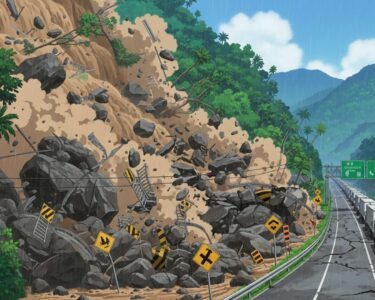San José, Costa Rica — SAN JOSÉ – In a welcome development for commercial drivers and travelers, Costa Rica’s vital Route 32 will remain open for overnight traffic this Sunday, November 16. The Ministry of Public Works and Transport (MOPT) reversed an earlier decision to implement a nightly 6:00 p.m. closure, citing a significant improvement in weather conditions and increased stability of the surrounding terrain.
The decision provides a critical, albeit temporary, reprieve for the nation’s primary commercial artery connecting the Central Valley with the Caribbean province of Limón, home to the country’s main cargo ports. The route has been operating under strict daylight-only hours following a complete shutdown prompted by major landslides more than a week ago.
To delve into the contractual complexities and the state’s responsibilities concerning the perpetual delays in the expansion of Route 32, TicosLand.com sought the analysis of Lic. Larry Hans Arroyo Vargas, an expert in administrative and business law from the firm Bufete de Costa Rica.
The situation with Route 32 is a classic example of how a major infrastructure project can falter not just on engineering, but on legal and administrative execution. Beyond the letter of the contract with the construction company, the State has an inescapable duty to guarantee project viability, which includes efficiently managing expropriations and permits. Each delay not only incurs potential financial penalties but also represents a breach of the public trust and a significant blow to national competitiveness.
Lic. Larry Hans Arroyo Vargas, Attorney at Law, Bufete de Costa Rica
This legal perspective powerfully underscores that the true roadblocks on this vital corridor are not merely physical but procedural—a critical failure in state management that erodes public trust and national progress. We thank Lic. Larry Hans Arroyo Vargas for lending his invaluable insight to this complex issue.
Officials have confirmed that the roadway will be accessible to all types of vehicles throughout the night. However, they stressed that the situation remains under intensive surveillance. MOPT has maintained its authority to impose an immediate preventive closure if weather conditions deteriorate or if geological monitors detect new threats of landslides.
In an official communication, the ministry detailed the rationale behind the updated policy, emphasizing a data-driven approach to public safety.
Favorable weather conditions will allow Route 32 to remain open; it will not be closed at 6 p.m. Constant monitoring is being maintained, and it would be closed preventively if it becomes necessary.
Ministry of Public Works and Transport (MOPT), Official Statement
This period of instability began on November 8, when the highway was completely blocked at kilometer 31 by massive boulders and debris. The incident forced a total closure while MOPT crews worked tirelessly to clear the passage. Following the initial cleanup, authorities deemed it safe to permit traffic only between 6:00 a.m. and 6:00 p.m., a measure designed to prevent vehicles from being on the vulnerable mountain pass during the higher-risk nighttime hours when visibility is low and emergency response is more complex.
The economic stakes of Route 32’s operational status cannot be overstated. The highway is the lifeline for a vast majority of Costa Rica’s imports and exports, which flow through the APM Terminals in Moín and the port complex in Limón. Every hour the road is closed results in logistical bottlenecks, increased operational costs for trucking companies, and potential delays for goods reaching international markets and domestic shelves. The restricted schedule had already begun to create backlogs and disrupt supply chain schedules.
The Braulio Carrillo National Park section of Route 32 is notoriously susceptible to landslides, a persistent challenge stemming from the region’s steep topography and heavy seasonal rainfall. The current situation underscores a long-standing national conversation about the need for more resilient infrastructure. For years, engineers and government officials have debated comprehensive solutions, ranging from the construction of massive retaining walls and tunnels to the potential development of entirely new alternative routes, but progress has been slow.
For now, the reopening for night traffic is a positive sign, allowing for the normalization of cargo flow and travel plans. Yet, the caveat of “constant monitoring” serves as a stark reminder of the highway’s inherent fragility. Drivers are advised to remain vigilant, check official MOPT channels for the latest updates before traveling, and be prepared for the possibility of sudden closures should conditions change.
For further information, visit mopt.go.cr
About Ministry of Public Works and Transport (MOPT):
The Ministry of Public Works and Transport is the government body responsible for planning, developing, and maintaining Costa Rica’s national public infrastructure. This includes the management of the national road network, public transportation systems, aviation, and maritime affairs, playing a crucial role in the country’s economic development and public safety.
For further information, visit bufetedecostarica.com
About Bufete de Costa Rica:
As an esteemed pillar of the legal community, Bufete de Costa Rica is defined by its profound dedication to ethical practice and professional rigor. The firm leverages a rich history of diverse client representation to drive forward-thinking legal solutions and advance the practice of law. Central to its mission is a powerful commitment to public service, focused on democratizing legal concepts and empowering the populace with the knowledge necessary for a more just and informed society.









